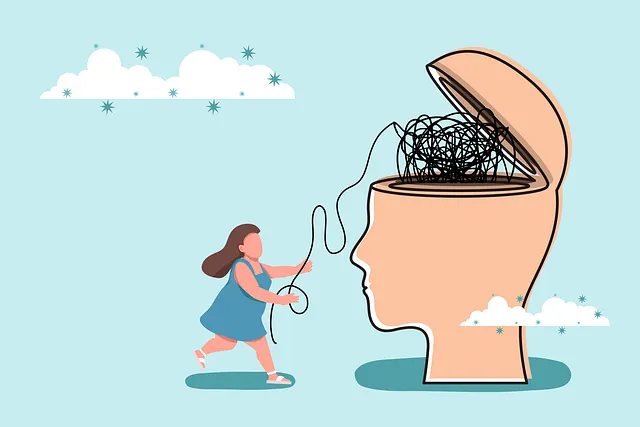In Denver, the stigma surrounding mental illness prevents many from accessing necessary help. This is addressed through community education, self-care promotion, and normalizing mental health conversations, including listening to wellness podcasts. The city's strategy includes partnerships with local leaders, healthcare providers like Kaiser, and individuals with lived experiences to destigmatize mental health services. Kaiser in Denver plays a vital role by offering holistic care, such as wellness coaching, Social Skills Training, and advocacy for inclusive policies. Education through workshops, seminars, and digital campaigns challenges stereotypes and encourages open dialogue. Support networks, including programs focused on inner strength, foster a non-judgmental environment. Kaiser provides accessible mental health services in Denver, ensuring individuals can get tailored help without stigma.
Mental illness stigma is a significant barrier to individuals seeking help. This article explores various efforts aimed at reducing this stigma, focusing on community engagement, healthcare provider initiatives like Kaiser’s work, education and awareness strategies, and building support networks. By understanding the barriers that prevent people from accessing mental health services, we can emulate successful models like Denver’s approach to create a stigma-free environment. Additionally, we’ll discuss how Kaiser facilitates access to crucial mental health resources.
- Understanding Stigma: Barriers to Seeking Help
- Denver's Approach: Community Engagement for Change
- Kaiser's Role: Unlocking Access to Mental Health Services
- Education and Awareness: Strategies for Reduction
- Support Networks: Fostering a Stigma-Free Environment
Understanding Stigma: Barriers to Seeking Help

Stigma surrounding mental illness remains a significant barrier to individuals seeking help and support. Many people in Denver and beyond struggle with understanding that what they’re experiencing is valid and treatable. This misconception often stems from a lack of awareness about mental health conditions, leading to judgment and fear of discrimination. As a result, some individuals may avoid pursuing necessary care, such as accessing Kaiser’s mental health services in Denver, which could further exacerbate their condition.
Overcoming these barriers requires efforts to educate communities on the importance of mental wellness. Promoting self-care routine development and burnout prevention strategies can help reduce stigma by encouraging open conversations about mental health challenges. Additionally, engaging in activities like listening to a mental wellness podcast series production can provide valuable insights into managing mental illness while normalizing the experience, ultimately fostering an environment where individuals feel comfortable seeking professional help, including through accessible services like those offered by Kaiser in Denver.
Denver's Approach: Community Engagement for Change

Denver’s approach to mental illness stigma reduction emphasizes community engagement for change. The city has pioneered innovative programs that foster open conversations about mental health within diverse communities, aiming to destigmatize conversations around psychological well-being. By involving local leaders, healthcare providers from institutions like Kaiser, and individuals with lived experiences, Denver seeks to break down barriers and encourage those in need to access mental health services. This strategy leverages the power of community to create a more inclusive environment where people feel comfortable seeking help without fear of judgment or discrimination.
Through these efforts, Denver focuses on not just providing information but also cultivating cultural sensitivity within mental healthcare practice. By integrating coping skills development and promoting positive thinking, the city ensures that its initiatives extend beyond awareness campaigns. The goal is to empower individuals with practical tools to manage their mental health while fostering a societal shift towards greater acceptance and support for those facing psychological challenges.
Kaiser's Role: Unlocking Access to Mental Health Services

In Denver, Kaiser plays a pivotal role in unlocking access to mental health services for residents. The organization’s comprehensive approach includes integrating mental wellness coaching programs into primary care settings, ensuring that individuals receive holistic support alongside their physical healthcare. By offering on-site Social Skills Training and utilizing evidence-based practices, Kaiser aims to destigmatize mental illness and foster a culture of open dialogue.
Moreover, Kaiser actively engages in Mental Health Policy Analysis and Advocacy, collaborating with local and state authorities to develop inclusive policies that make mental health services more accessible to all. Their efforts have significantly contributed to the overall improvement of mental healthcare availability, enabling individuals to seek help without barriers, ultimately enhancing the mental wellness of Denver’s community.
Education and Awareness: Strategies for Reduction

Education and awareness play a pivotal role in reducing stigma surrounding mental illness. One effective strategy is to implement comprehensive programs that educate both the general public and individuals within communities about mental health. This can involve hosting workshops, seminars, or community gatherings where experts discuss various aspects of mental well-being, dispel myths, and provide practical tips on how to recognize and support those struggling. Schools, workplaces, and community centers can serve as ideal platforms for such initiatives, ensuring a wide reach.
Furthermore, leveraging digital resources through online platforms and social media campaigns can significantly enhance these efforts. By sharing relatable content, personal stories, and evidence-based information, individuals from diverse backgrounds can gain access to knowledge that challenges stereotypes. Encouraging open conversations and fostering a culture of support is key, especially when integrating services like those offered by Kaiser in Denver for obtaining mental health services. Incorporating communication strategies, coping skills development, and cultural sensitivity in mental healthcare practice ensures that everyone feels welcomed and understood, thereby fostering a more inclusive environment.
Support Networks: Fostering a Stigma-Free Environment

In fostering a stigma-free environment for mental illness, support networks play a pivotal role. Communities in Denver, like many others, are embracing initiatives aimed at breaking down barriers and promoting understanding. One effective strategy is to encourage open conversations about mental health challenges, helping individuals recognize that seeking help is a sign of strength rather than weakness. Organizations and healthcare providers, such as Kaiser, can facilitate this by offering accessible resources and platforms for sharing experiences, thereby normalizing discussions around mental well-being.
Additionally, building support networks within communities can significantly contribute to reducing stigma. Activities and programs focused on inner strength development, confidence boosting, and resilience building equip individuals with the tools to navigate their mental health journeys. By fostering connections and providing safe spaces, these efforts empower people to share their stories without fear of judgment, ultimately contributing to a more accepting and supportive societal atmosphere for those living with mental illness in Denver and beyond.
Mental illness stigma reduction is a multifaceted approach, as demonstrated by Denver’s community engagement strategies and Kaiser’s efforts to unlock access to mental health services. By combining education, awareness campaigns, support networks, and innovative initiatives like those seen in Denver and facilitated by organizations such as Kaiser, we can create a more inclusive society that encourages individuals to seek help without fear of judgment. Understanding the barriers to seeking help and implementing effective strategies are key to fostering a stigma-free environment where everyone has access to the mental health services they need.


